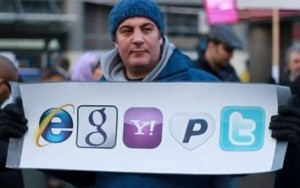In these early days of 2011, contrary to the opinions of some, social networking has passed the tipping point. An interesting assertion but how do we know this?
All we can do is look at the evidence of these changes and it is mounting. We review the numerous attempts to impair internet communications and access to social media and start by sharing this quote during the crisis in Egypt.
“Clearly, what’s rattled the government is the major role that social media has played in the protests rocking the country’s cities, including Cairo.
“Facebook, Twitter, YouTube, and even Google Docs have been used in unprecedented ways this time around — both for coordination, and for disseminating news,” Jillian York, Harvard University, Berkman Center for Internet & Society
 Our small, medium and large screens are filled with images from around the world starting from the ongoing revolutions in the Middle East and North Africa, first the fall of #Tunisia, then #Egypt and now #Libya where it seems to only be a matter of time.
Our small, medium and large screens are filled with images from around the world starting from the ongoing revolutions in the Middle East and North Africa, first the fall of #Tunisia, then #Egypt and now #Libya where it seems to only be a matter of time.
And not surprisingly, at this time even the protests in Iran and China are starting to heat up again and the governments there are clamping down quickly each time before the protest momentum can build to any significant level.
But interestingly there are also emerging examples here in North America surrounding both labor #wiunions and entertainment #oscars that are also demonstrative of the accelerating impact of social.
Of specific interest from a North American perspective are the events now taking place in Madison Wisconsin where the Governor is taking on organized public sector labor and meeting significant resistance.
One of the common reactions by leaders in all of these cases has been their attempts to shut down communications, whether it is social media site blocking, internet access, mobile/wireless networks, phone lines and even banning journalists. Here are reports on these activities from Tunisia, Egypt, Libya, China and most surprisingly even from Madison, Wisconsin!
Based on all the different workarounds that appeared, allowing people to transmit their tweets elsewhere to be posted, it has become apparent that there is no longer effective ways for governments to stop people who have the will to communicate.
In the entertainment world, the power of the hashtag is also being clearly demonstrated today. @TheAcademy Awards don’t start in for another four hours and the hashtag #oscars has already been included in 725,000 tweets and they are coming in at a rapidly accelerating 600 per minute.(Ed. note: #oscars tweets topped out just over 1.9 million with peak rate of 12,000 per minute during show)
Many of these protests have been drives for the freedom to replace leaders living opulent lives on the backs of people who are dissatisfied with low wages, high unemployment and rising food prices due to shortages. Personally though, I am very surprised by the people I talk to who think these are problems that are isolated to the Middle East, North Africa and elsewhere, as there are many disenfranchised, impoverished and unemployed people in all parts of the world.
We are in the early days of unrest fueled by the ability to organize and mobilize quickly facilitated by social networking. Look at all of the significant changes underway at this point when less than 1 billion are registered on the main social media platforms. Think of this in the context of a world population which is approaching 7 billion the majority of which are already armed with mobile devices.
Looking at this from both business and government perspectives, obvious parallels can easily be drawn to ineffective leaders anywhere in the world as their employees, shareholders and citizens communicate, connect, discover and wield the power of the #hashtag.
Jeff Ashcroft